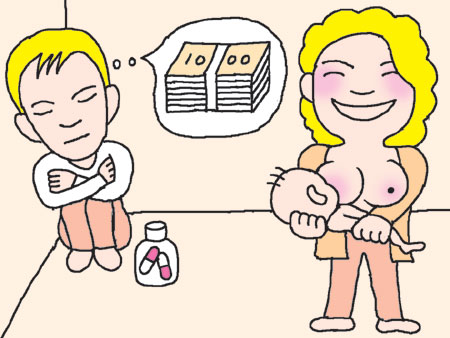임신은 여성에게 엄청난 변화를 가져온다(bring about profound changes in women). 엄마가 되면서 눈에 띄게 달라진다(be conspicuously altered by motherhood).
그런데 남성도 신체적·정신적 변화를 경험한다고(undergo physical and psychological transformations) 한다. 미국 노스웨스턴대학 연구팀에 따르면, 남성은 출산이라는 신체적 과정을 겪는(go through the physical process of childbirth) 것은 아니지만, 남성호르몬인 테스토스테론이 3분의 1 줄어들어(drop by one third) 덜 공격적이 되고, 보다 다정한 면을 보이는(become less aggressive and display a more caring side) 것으로 조사됐다.
이런 현상은 암컷·수컷이 새끼 돌보기를 분담하는(share the care of their offspring), 인간 외에 몇 안 되는 영장류(the few primates other than humans) 중 하나인 마모셋 원숭이 실험에서 실제로 확인됐다. 수컷들에게 새끼들 냄새를 풍겨줬더니(give the males a whiff of their babies’ scent) 테스토스테론 수치가 뚝 떨어졌다. 자기 새끼가 생겼다는 스트레스에 호르몬 변화라는 신체적 반응을 보인(show a physical response to the stress with hormonal shifts) 것이다.

뇌에도 변화가 생긴다. 감정처리와 관련된(be associated with the processing of emotion) 대뇌 측두엽 해마에 새 세포들을 생성한다(generate new cells in the hippocampus). 또 뇌세포가 계획과 기억을 담당하는 뇌 부위(the part of the brain responsible for planning and memory)인 전두엽 앞쪽 피질에서 보다 효율적인(be more effective in the prefrontal cortex) 움직임을 보인다.
체중도 늘어난다. 마모셋 원숭이 수컷은 새끼가 태어났을 때 쓸 여분의 에너지를 준비하기 위해(in preparation for the extra energy) 배와 엉덩이가 커지면서 몸무게가 20%까지 늘어났다(gain up to 20 per cent of their body weight).
예비 아빠들도 10명 중 1명꼴로 산후 우울증을 겪는다(suffer from postnatal depression). 가족을 부양하는 가장의 부담감(the pressure of a breadwinner) 등 압박감이 우울증으로 이어진다. 음식 욕구, 감정 기복, 메스꺼움(food cravings, mood swings, nausea) 등 여성 임신 증세를 경험한다(experience the pregnancy symptoms). 심지어 상상 임신을 호소하는(complain of phantom pregnancy) 경우도 있다.
남성들은 자식들이 태어난 뒤 한 가지 더 변화를 겪어야 한다. 돈이 들어 있던 지갑에(in the wallet where his money used to be) 돈은 없어지고 대신 아이들 사진을 넣고 다니게 된다.
문복록
2012년 1월 12일 at 12:05 오후
그레게 말이야…남자는 그냥 먹고 말아야해 …같이살자 결혼같은 소리은 말아야된다 알앗어면 …실시..복창하고 실시..